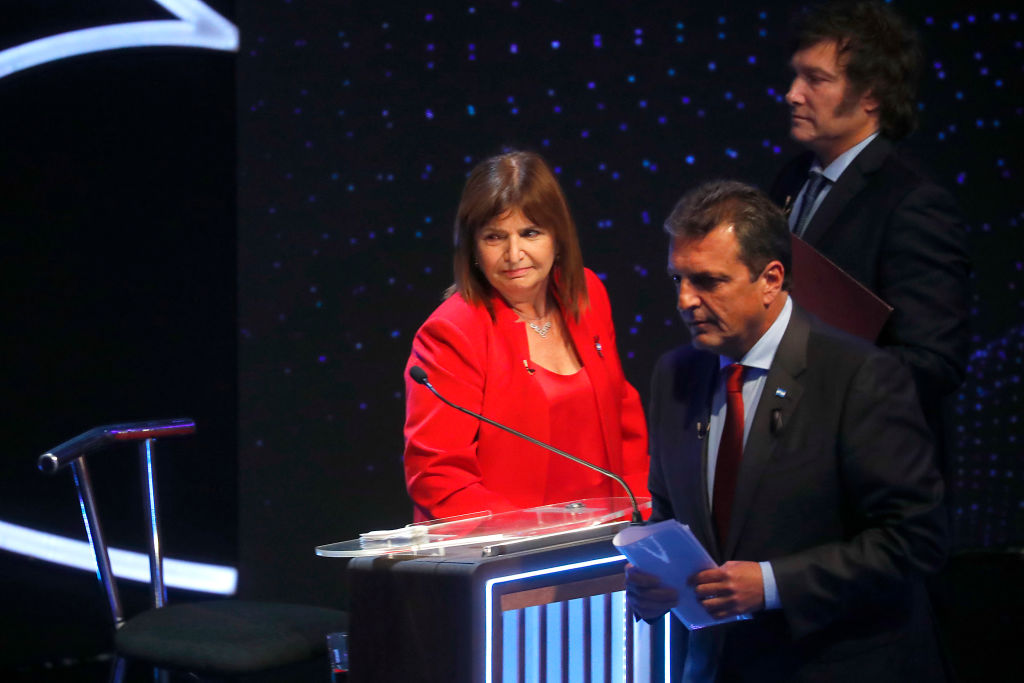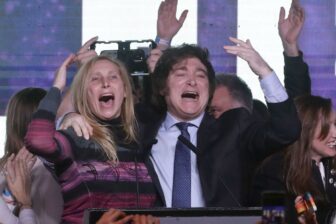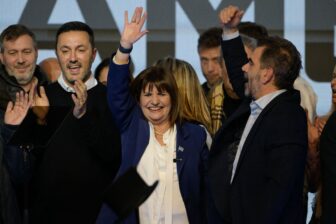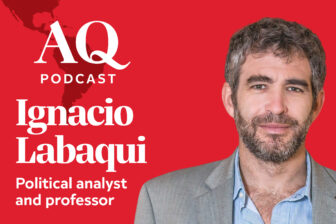The meteoric rise of Javier Milei, a self-described anarcho-capitalist, paleo-libertarian and social media-first phenomenon, has been the biggest story of Argentina’s 2023 election.
Now considered the front-runner in the October 22 vote, Milei’s ascent reflects a major shift in the politics of Latin America’s third-largest economy. But what often goes unnoticed is the shared political lineage that unites Milei and his two main competitors, Sergio Massa (the governing coalition’s candidate) and Patricia Bullrich (leader of the largest opposition coalition, Juntos por el Cambio).
This shared endowment can be traced back to a small party from the late 1980s: the Unión de Centro Democrático, or Ucedé. Despite being an electorally feeble presence in a political landscape dominated by Peronism and anti-Peronism, the Ucedé has had an outsized influence on politics in recent years.
Born during Argentina’s re-democratization and spearheaded by Álvaro Alsogaray, an ally of several of the military or military-aligned governments that ruled Argentina between 1955 and 1983, the Ucedé unapologetically advocated for a free-market agenda. A recent book chronicles how Alsogaray believed even the junta that ruled Argentina from 1976 to 1983 was insufficiently committed to free-market ideology and reforms.
In the context of re-democratization, the Ucedé’s anti-populist, conservative, free-market, stances set it apart from the two major political parties of the time—the Peronist Partido Justicialista (PJ) and the anti-Peronist Unión Cívica Radical (UCR), both of which leaned towards state interventionism and economic heterodoxy.
Following the hyperinflation and growing dissatisfaction during the later years of Raúl Alfonsín’s administration (1983-1989), Alsogaray’s free-market message resonated—somewhat, anyway—with voters in the 1989 election, when it secured nearly 10% of the national vote.
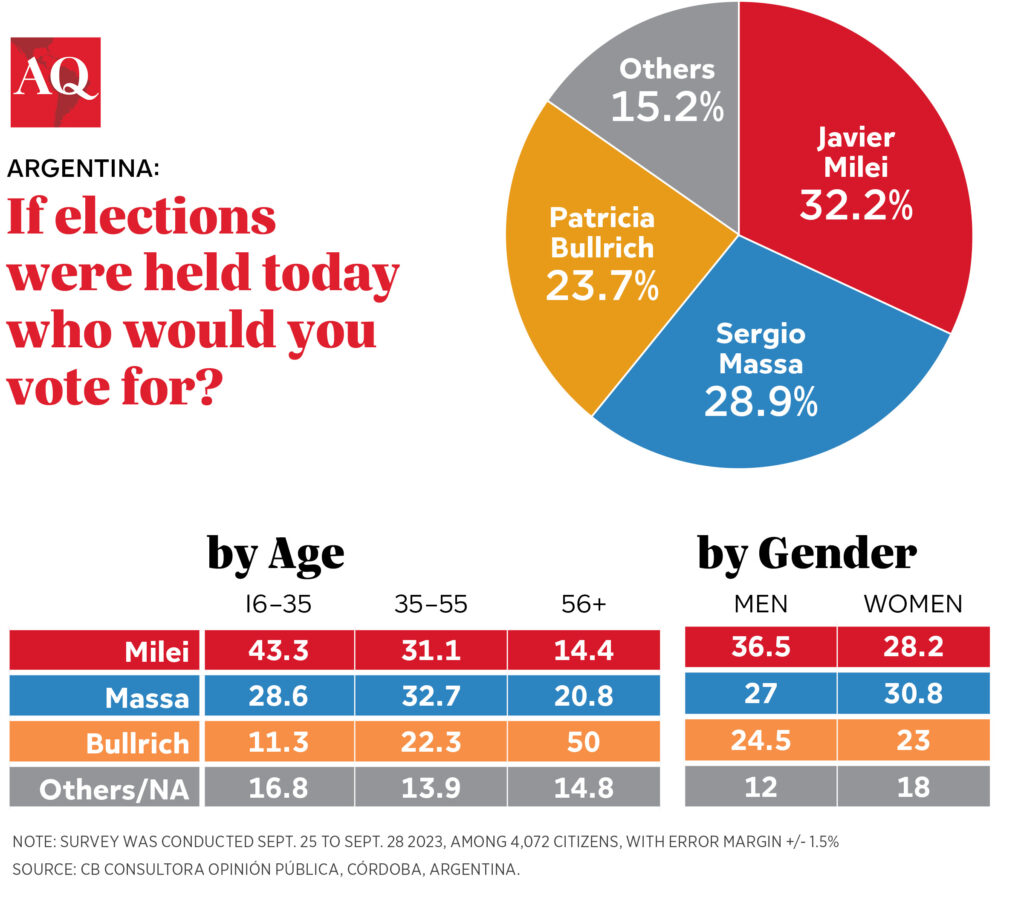
Political scientist James Loxton has recently shown how the Ucedé provided both political support and ideological heft to Carlos Saúl Menem’s presidency (1989-99). Menem, a provincial leader and an ideological empty vessel, campaigned on a typical Peronist agenda. But not long after taking office, he implemented a series of market-oriented reforms, including privatizations, largely influenced by the Ucedé and other like-minded ideologues. Menem dismantled much of the state apparatus established during Juan Domingo Perón’s rule starting in 1946, and also implemented a currency board system that pegged Argentina’s peso at parity with the US dollar.
For several years under Menem and the Ucedé-inspired policy mix, Argentina’s economy enjoyed a measure of success. But everything collapsed in 2001 in an intertwined political and economic crisis that saw the country churn through five presidents in two weeks. Until recently, the 2001 collapse relegated free-market or “neoliberal” ideas to widespread disgrace, a stigma that seems to have meaningfully lifted only recently.
Indeed, like Alsogaray, Milei places the roots of Argentina’s “decline” around “seventy years ago,” coinciding with Perón’s rise to power. He contends that the nation’s political and economic elites “abandoned” the “ideas of liberty,” decrying the “parasitic caste” of politicians and businessmen that he views as a by-product of Perón’s rule.
Similar to Alsogaray, Milei seems agnostic in terms of the superiority of the current representative democratic system and process as the only way to enact his radical reforms. In recent months, Milei’s apparent refusal to explicitly commit to democracy, and his routine attacks on the political system, are raising eyebrows—even among some of his longstanding patrons.
Key figures from the Menem era who shared the Ucedé’s free-market commitments include former economy minister Domingo Cavallo. In the 1990s, Cavallo sought to replicate the Ucedé’s influence through a party of his own, Acción por la República. Other free marketeers who had not joined in Menem’s government, such as Ricardo López Murphy (a UCR member and University of Chicago graduate), later vied for the fiscally conservative vote tied to the Ucedé after the 2001 debacle. López Murphy’s party Recrear and Cavallo’s Acción later coalesced into Mauricio Macri’s Compromiso para el Cambio, the precursor to Propuesta Republicana (PRO)—currently led by Patricia Bullrich.
Bullrich had not yet disavowed the left-wing Peronist ideas of her youth at the time of the Ucedé’s electoral apex. Yet she has slowly but steadily drifted rightwards politically. Part of that process included sharing a ballot with López Murphy in 2003 under the Recrear label. Later, as security minister, Bullrich became one of the most hawkish figures in Mauricio Macri’s government (2015-2019) and adopted a discourse that tracks closely to the Ucedé’s “roads to freedom.”
Other top players in today’s Argentinean politics have a sociological rather than ideological kinship with the Ucedé.
Sergio Massa, the current finance minister, and second-place finisher in the August initial round of the presidential contest, was a young Ucedé activist in the 1980s and 90s. Massa’s one-time Ucedé mentor is now a local organizer for Bullrich. Like many others among the Ucedé’s progeny, Massa eventually joined the ranks of the Peronist PJ.
Massa’s many political identities included stints in Néstor Kirchner’s administration (2003-2007) and as chief of staff to Cristina Fernández de Kirchner’s during her first presidential term (2007-2011). In that environment, he embraced the Kirchners’ left-wing nationalist rhetoric and helped implement their populist policies.
Massa’s later rupture with the Kirchners helped enable Mauricio Macri’s rise to power in 2015. After saying his former political bosses should go to jail, Massa’s 2019 reconciliation with Cristina Kirchner marked another twist in his sinuous political journey. However, he occasionally hints at his Ucedé roots, as demonstrated by his recent criticism of Cuba and Venezuela, two sacred cows for portions of the left. This, along with Massa’s mentions of connections with Washington-based politicians, suggests a possible departure from the current policy he is presiding over, associated with inflation rising to as much as 140% this year, according to some analysts, and other challenges including rising poverty.
While the Ucedé’s influence became less obvious after its early ’90s electoral peak, the current shift in the political landscape may make its ideas as relevant as ever. High inflation, the proliferation of multiple exchange rates and import controls that threaten the supply of essential goods all may help make Ucedé-adjacent platforms advocating fiscal orthodoxy and liberalization more appealing to much of the population than the current government’s heterodox policies.
As the October election approaches, the question is not whether the Ucedé’s legacy will manifest itself in the new presidential term. It is rather whether it will manifest through Milei’s more radical proposals, or through milder forms such as Bullrich’s bi-monetary plan or in what seems a possible pivot by Massa away from hardline kirchnerismo. It looks like a half-forgotten chapter of Argentine history is still being written.
Caso Bello is a freelance writer and analyst, and a lecturer at the University of Ottawa.

